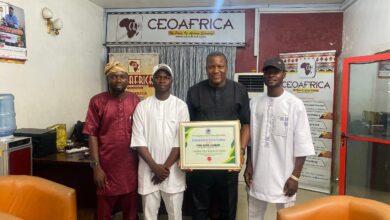Osinbajo: Cooperatives Help FG Implement Intervention Programs
Vice-President Yemi Osinbajo has stated that cooperatives play a critical role in implementing the government’s social investment and intervention programs, which are designed to reach a large number of people.
Osinbajo said cooperatives are an important part of government strategy in ensuring that the largest number of Nigerians have access to government programs when he met with a delegation from the Cooperative Federation of Nigeria (CFN) led by its President, Chief Tajudeen Oriyomi Ayeola, at the State House in Abuja on Tuesday.
“Cooperative partnerships with government may be the only way to do so in an efficient manner that ensures that government services and programs reach the right people,” he says.
“Cooperatives give their members the power to take advantage of facilities and ensure that they are returned. They also have a better understanding of each of their members.”
Read also: Magodo: Where AGF Malami was canonized a saint
“The rationale for cooperatives, even in the 1950s, remains relevant today,” the vice-president added. When we discuss cooperatives in the Western Region and how they have been extremely beneficial, cooperatives across the country have become important pillars in the country’s economic development.”
Giving an example of how cooperatives have helped, Osinbajo stated that the government believes cooperatives will be very useful in all of the programs related to the Economic Sustainability Plan.
“One of them is the Family Homes Funds, which has a plan to build 300,000 units of social housing,” he said.
“The case for cooperatives is very well made,” he said, “and what we as a government must do is look for ways to cooperate with the Cooperative Associations in order to get this moving.”
Femi Adewole, the Managing Director of Family Homes Fund (FHF), which is implementing the ESP’s Social Housing component, gave an update on the work done so far on the National Social Housing Programme earlier in his remarks.
“As of year-end 2021, 17,281 homes are in various stages of construction across 15 states, either completed or in progress,” he said.
While waiting for disbursements from the Central Bank of Nigeria (CBN), the FHF MD stated that the organization was able to mobilize other resources such as N10 billion from the Ministry of Finance, $60 million from the African Development Bank, €20 million from the Agence Française De Développement, and about N20 billion in recycled capital from completed property sales to complete the Social Housing program last year.
FHF plans to build 20,640 units with its own funds in 2022, but he believes that CBN disbursements will allow them to do even more, he said.
Read also: Progressive women raise alarm over plots by some APC Govs to destroy party at February Convention
According to the MD, FHF entered into a partnership with CFN in May last year in order to reach a wider target audience outside of those in formal employment, particularly the large population of citizens in the informal sector, with the goal of leveraging their reach to mobilize demands in groups from people in the informal sector.




